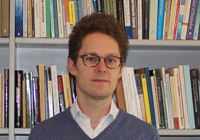
Paul Egré
CNRS Researcher, Institut Jean Nicod, and Professor of Philosophy,
École normale supérieure, Paris
Paul Egré (born in 1975) is a CNRS (Centre national de la
recherche scientifique) researcher based
at the Institut Jean Nicod, Paris and a Professor at the Department of Philosophy at the École normale
supérieure, Paris. After studying philosophy and mathematical logic at Université Paris Diderot – Paris 7
and at Princeton University, he obtained his Ph.D. in Philosophy at the Université Paris 1 Panthéon-
Sorbonne in 2004. Egré was hired by CNRS in 2005 and has been a member of the Institut Jean Nicod
ever since.
Egré’s research focuses mostly on language and cognition, with specific interests in natural language
semantics, philosophical
logic, epistemology and the philosophy of mind. Between 2008 and 2011,
Egré led an ANR-funded (Agence nationale de la
recherche) research program on the ‘Cognitive
Origins of Vagueness’, a topic on which he has published several papers. With Benjamin Spector, he
is currently the co-principal investigator of an ANR-funded project on ‘Trivalence and Natural Language
Meaning’ (2014–2017).
Egré has been an invited professor at several universities since 2005, including the University of California,
Los
Angeles; New York University; and the Hebrew University of
Jerusalem. He is the editor-in-chief of
the Review of Philosophy and
Psychology, a quarterly journal published by Springer, and an
associate
editor
of several journals, including the Journal of Philosophical Logic. Among his recent publications are
the
volume Vagueness and Language Use (eds. P. Egré and N. Klinedinst, Palgrave Macmillan, 2011), and
two
papers: “Borel on the Heap” (P. Egré and A. Barberousse, in Erkenntnis, 2014), and “Moral asymmetries
and
the semantics of many” (P. Egré and F. Cova, in Semantics and Pragmatics, 2015).
During his stay at SCAS, Paul Egré will work on two main projects concerning the formalization of ordinary
reasoning. One project is collaborative with John Cantwell and Hans Rott and aims at a better understanding
of hypothetical reasoning. Another project concerns the formalization of ordinary reasoning with vague
predicates, a topic on which Egré is finishing several papers and preparing a book.
This information is accurate as of the academic year 2015-16.






